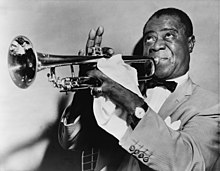This articleappears to be adictionary definition.(May 2023) |
In music, asolo(Italianfor 'alone') is apieceor asectionof a piece played or sung featuring a single performer, who may be performing completely alone or supported by an accompanying instrument such as a piano ororgan,acontinuogroup (in Baroque music), or the rest of a choir, orchestra, band, or other ensemble. Performing a solo is "to solo", and the performer is known as asoloist.

The plural issolior theanglicisedformsolos.In some contexts these are interchangeable, butsolitends to be restricted to classical music, and mostly either the solo performers or the solopassagesin a single piece. Furthermore, the wordsolican be used to refer to a small number of simultaneous parts assigned to single players in an orchestral composition. In the Baroqueconcerto grosso,the term for such a group of soloists wasconcertino.
An instrumental solo is often used in popular music during abreakorbridgeto add interest and variety to a part of the song without lyrics.[citation needed]
History
edit18th century
editIn theBaroqueandClassicalperiods, the wordsolowas virtually equivalent tosonata,and could refer either to a piece for one melody instrument with (continuo) accompaniment, or to a sonata for an unaccompanied melody instrument, such asJohann Sebastian Bach’ssonatas for violin alone.[1]
See also
editSources
edit- ^David Fuller, "Solo",The New Grove Dictionary of Music and Musicians,second edition, edited byStanley SadieandJohn Tyrrell(London: Macmillan Publishers, 2001).